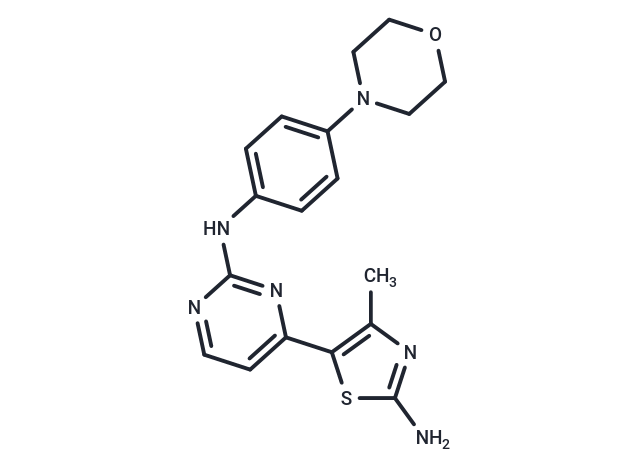Shopping Cart
Remove All Your shopping cart is currently empty
Your shopping cart is currently empty
CYC116 is a potent inhibitor of Aurora A/B with Ki of 8.0 nM/9.2 nM, is less potent to VEGFR2 (Ki of 44 nM), with 50-fold greater potency than CDKs, not active against PKA, Akt/PKB, PKC, no effect on GSK-3α/β, CK2, Plk1 and SAPK2A. Phase 1.

| Pack Size | Price | USA Warehouse | Global Warehouse | Quantity |
|---|---|---|---|---|
| 5 mg | $40 | In Stock | In Stock | |
| 10 mg | $64 | In Stock | In Stock | |
| 25 mg | $129 | In Stock | In Stock | |
| 50 mg | $197 | In Stock | In Stock | |
| 100 mg | $297 | In Stock | In Stock | |
| 200 mg | $442 | - | In Stock |
| Description | CYC116 is a potent inhibitor of Aurora A/B with Ki of 8.0 nM/9.2 nM, is less potent to VEGFR2 (Ki of 44 nM), with 50-fold greater potency than CDKs, not active against PKA, Akt/PKB, PKC, no effect on GSK-3α/β, CK2, Plk1 and SAPK2A. Phase 1. |
| Targets&IC50 | Aurora A:8 nM(Ki), Aurora B:9.2 nM(Ki) |
| In vitro | The most Aurora-selective CYC116 shows inhibitory effect on Aurora A and B kinases 50-fold more potently than any of the CDKs assayed. [1] CYC116 is initially screened against a panel of human leukemia and solid tumor cell lines using an MTT antiproliferative assay. The results show that CYC116 has broad-spectrum antitumor activity and shows specific cytotoxicity against the acute myelogenous leukemia cell line MV4-11 with IC50 of 34 nM. [1] In addition, anti-proliferative activity of CYC116 is found to be associated with Aurora A and B modulation such as, inhibition of Aurora autophosphorylation, reduction of histone H3 phosphorylation, polyploidy, followed by cell death, resulting from a failure in cytokinesis. [1] |
| In vivo | Mice bearing subcutaneous NCI-H460 xenografts are given CYC116 orally for 5 days, at dose levels of 75 and 100 mg/kg q.d. It leads to tumor growth delays of 2.3 and 5.8 days, which translated into specific growth delays of 0.32 and 0.81, respectively. [1] |
| Kinase Assay | Kinase Assays: Aurora A kinase assays are performed using a 25 μL reaction volume (25 mM β-glycerophosphate, 20 mM Tris/HCl, pH 7.5, 5 mM EGTA, 1 mM DTT, 1 mM Na3VO4, 10 μg of kemptide (peptide substrate)). Recombinant Aurora A kinase is diluted in 20 mM Tris/HCl, pH 8, containing 0.5 mg/mL BSA, 2.5% glycerol, and 0.006% Brij-35. Reactions are started by the addition of 5 μL Mg/ATP mix (15 mM MgCl2, 100 μM ATP, with 18.5 kBq γ-32P-ATP per well) and incubated at 30°C for 30 minutes before termination with 25 μL of 75 mM H3PO4. Aurora B kinase assays are performed like Aurora A except that prior to use, Aurora B is activated in a separate reaction at 30°C for 60 minutes with inner centromere protein. |
| Cell Research | Standard MTT assays are performed. In short, cells are seeded into 96-well plates according to doubling time and incubated overnight at 37°C. Test compounds are made up in DMSO, a 3-fold dilution series is prepared in 100 μL of cell medium, added to cells (in triplicates) and incubated for 72 or 96 hours at 37°C. MTT is made up as a stock of 5 mg/mL in cell medium, and the solution is filter-sterilized. Medium is removed from the cells followed by a wash with PBS. MTT solution is then added at 20 μL/well and incubated in the dark at 37°C for 4 hours. MTT solution is removed and cells are again washed with 200 μL of PBS. MTT dye is solubilized with 200 μL/well of DMSO by agitation. Absorbance is read at 540 nm and data analyzed using curve-fitting software to determine IC50 values. (Only for Reference) |
| Molecular Weight | 368.46 |
| Formula | C18H20N6OS |
| Cas No. | 693228-63-6 |
| Smiles | Cc1nc(N)sc1-c1ccnc(Nc2ccc(cc2)N2CCOCC2)n1 |
| Relative Density. | 1.355 |
| Storage | Powder: -20°C for 3 years | In solvent: -80°C for 1 year | Shipping with blue ice/Shipping at ambient temperature. | |||||||||||||||||||||||||
| Solubility Information | DMSO: 13.4 mg/mL (36.37 mM), Sonication is recommended. H2O: < 1 mg/mL (insoluble or slightly soluble) Ethanol: < 1 mg/mL (insoluble or slightly soluble) | |||||||||||||||||||||||||
Solution Preparation Table | ||||||||||||||||||||||||||
DMSO
| ||||||||||||||||||||||||||
| Size | Quantity | Unit Price | Amount | Operation |
|---|

Copyright © 2015-2026 TargetMol Chemicals Inc. All Rights Reserved.